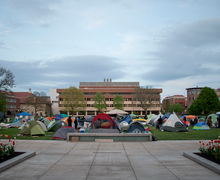SU gyms need to be more inclusive to ensure their toxic culture doesn’t persist
Wendy Wang | Senior Staff Photographer
SU’s toxic workout culture should be abandoned for a more inclusive and accepting environment in gyms on campus.
As the winter months draw on at Syracuse University, many students utilize the on-campus gyms to exercise. Whether students are working towards personal fitness goals, training for sports or exercising for a serotonin boost, SU’s gym facilities are popular hubs for students to burn off stress and temporarily work up some heat in the midst of the winter’s chill.
While some students leave the gym with a boost of serotonin, others leave feeling defeated. Toxic workout culture is a prevalent issue across college campuses, and it can be seen in the habits practiced by SU gym goers as well as in the energies exuded in workout spaces like the Barnes Center at The Arch and the Ernie Davis Fitness Center.
The very nature of college lends itself to habits of over-exercising, pushing personal limits that result in injury and potential exercise addictions. College students may feel pressured to keep up in the gym to maintain a certain physical appearance while adapting to the shift in lifestyle habits that takes place while away at school.
Medical researcher Wan-Jing Chen wrote that exercise addiction is usually related to eating disorders and body image disorders. Eating disorders and negative body image affect between 10-20% of women and 4-10% of men in college, according to the Child Mind Institute, and rates are on the rise.
Eating disorders and unhealthy exercise habits may become exacerbated for some students when they begin college, as students deal with a high-stress environment and changes in eating habits. After scoring poorly on a test or indulging in a late-night snack, some students may feel that overcompensation in the gym is necessary.
Additionally, the atmosphere of SU gyms can be intimidating for some students, regardless of previous gym experience. Women may be subjected to judgment due to the male dominated environment, therefore dissuading them from taking full advantage of gym facilities.
SU freshman Kathryn Hendry said she was an avid gym goer before college. However, she said her habits have changed since coming to college and adapting to the new gym environment.
“I feel like people could be judging me if I do something wrong, so I’m scared to try new things. Sometimes I will go in with the intent of doing a weighted workout, but the machines and benches are taken up, usually by men. I will end up doing a cardio workout instead,” Hendry said.
Students may also experience guilt for taking time to rest, and Hendry said she has experienced this type of guilt. “Being busy all of the time adds to the pressure of feeling like you need to go to the gym. I have less time to workout but then feel guilty for not going. It’s like a never-ending cycle,” she said.
Toxic workout culture should have no place on SU’s campus. Exercise is a necessary component for maintaining good physical and mental health. On-campus gyms need to be inclusive of different ability levels, gender identities and physical appearances. All students deserve to reap the benefits of the state-of-the-art facilities that are housed on campus.
SU could provide seminars on how to use equipment during times that are less busy. Similar to how students sign up for workout classes, gym staff could provide educational sessions for students that want to try weighted workouts or machinery. Visual diagrams of how to use certain machines throughout the gym would also prove helpful not only in reiterating safety, but to ensure that students are using equipment correctly to maximize their workouts.
Gym staff could be positioned strategically throughout the gym in efforts to assist beginners or provide guidance to those who may need it. Having staff patrolling the floor may also prevent groups from congregating or individuals from spending excessive amounts of time on popular machines.
If SU gyms become more accessible, a wider range of students will be able to reap the many benefits of being active. If the environment in the gym changes, it will increase motivation and decrease ostracization and gym-related guilt. Focusing on intuitive exercise is the key to maximizing gym experiences and living a balanced lifestyle while at college.
Cara Steves is a freshman magazine, news and digital journalism major. Her column appears biweekly. She can be reached at [email protected].
Published on February 15, 2022 at 10:11 pm





